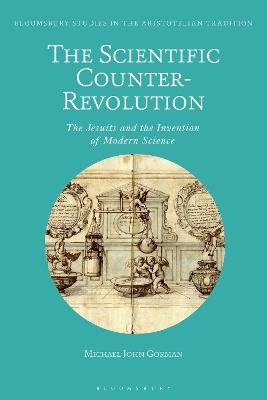
The Scientific Counter-Revolution
The Jesuits and the Invention of Modern Science
Seiten
2020
Bloomsbury Academic (Verlag)
978-1-350-09195-5 (ISBN)
Bloomsbury Academic (Verlag)
978-1-350-09195-5 (ISBN)
Jesuit engagement with natural philosophy during the late 16th and early 17th centuries transformed the status of the mathematical disciplines and propelled members of the Order into key areas of controversy in relation to Aristotelianism. Through close investigation of the activities of the Jesuit 'school' of mathematics founded by Christoph Clavius, The Scientific Counter-Revolution examines the Jesuit connections to the rise of experimental natural philosophy and the emergence of the early scientific societies.
Arguing for a re-evaluation of the role of Jesuits in shaping early modern science, this book traces the evolution of the Collegio Romano as a hub of knowledge. Starting with an examination of Clavius’s Counter-Reformation agenda for mathematics, Michael John Gorman traces the development of a collective Jesuit approach to experimentation and observation under Christopher Grienberger and analyses the Jesuit role in the Galileo Affair and the vacuum debate. Ending with a discussion of the transformation of the Collegio Romano under Athanasius Kircher into a place of curiosity and wonder and the centre of a global information gathering network, this book reveals how the Counter-Reformation goals of the Jesuits contributed to the shaping of modern experimental science.
Arguing for a re-evaluation of the role of Jesuits in shaping early modern science, this book traces the evolution of the Collegio Romano as a hub of knowledge. Starting with an examination of Clavius’s Counter-Reformation agenda for mathematics, Michael John Gorman traces the development of a collective Jesuit approach to experimentation and observation under Christopher Grienberger and analyses the Jesuit role in the Galileo Affair and the vacuum debate. Ending with a discussion of the transformation of the Collegio Romano under Athanasius Kircher into a place of curiosity and wonder and the centre of a global information gathering network, this book reveals how the Counter-Reformation goals of the Jesuits contributed to the shaping of modern experimental science.
Michael John Gorman is Professor of Life Sciences in Society at Ludwig-Maximilians-University, Munich, Germany and Founding Director of BIOTOPIA Naturkundemuseum Bayern, Germany.
Introduction
1. Establishing Mathematical Authority and the Politics of Christoph Clavius
2. Trusting the Jesuit Mathematicus
3. Grienberger, Mathematics and Modesty in the Collegio Romano
4. The Uses of Correspondence
5. Magnetic Declination and the Problem of Longitude
6. Discipline and Authority
7. Experiment, Expertise and Centralized Authority
8. Theatricality and the Failure of Replication
Appendix: Documenting Public Mathematics in the Collegio Romano
Bibliography
Index
| Erscheinungsdatum | 18.09.2020 |
|---|---|
| Reihe/Serie | Bloomsbury Studies in the Aristotelian Tradition |
| Verlagsort | London |
| Sprache | englisch |
| Maße | 156 x 234 mm |
| Gewicht | 585 g |
| Themenwelt | Geisteswissenschaften ► Philosophie ► Geschichte der Philosophie |
| Geisteswissenschaften ► Philosophie ► Philosophie der Neuzeit | |
| Mathematik / Informatik ► Mathematik | |
| Naturwissenschaften | |
| ISBN-10 | 1-350-09195-2 / 1350091952 |
| ISBN-13 | 978-1-350-09195-5 / 9781350091955 |
| Zustand | Neuware |
| Informationen gemäß Produktsicherheitsverordnung (GPSR) | |
| Haben Sie eine Frage zum Produkt? |
Mehr entdecken
aus dem Bereich
aus dem Bereich
eine Geschichte der Zuversicht von Homer bis zum Klimawandel
Buch | Hardcover (2024)
C.H.Beck (Verlag)
CHF 39,20
die kolonialen Wurzeln der französischen Theorie
Buch | Hardcover (2024)
Matthes & Seitz Berlin (Verlag)
CHF 41,90


